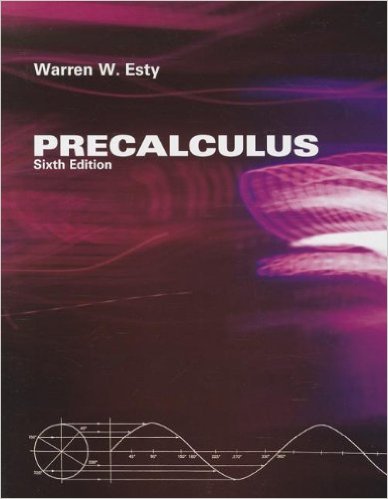Precalculus -- Preparing Students for Calculus
Precalculus, by Warren Esty
Sixth edition
(This page updated August 29, 2020. Minor changes, March 29, 2025)
 A text designed to produce a deep understanding of algebra and trigonometry so that students will be comfortable with their next math. Students will be well-prepared for calculus. This text is designed to be appropriate for self-study, as well as classroom use.
A text designed to produce a deep understanding of algebra and trigonometry so that students will be comfortable with their next math. Students will be well-prepared for calculus. This text is designed to be appropriate for self-study, as well as classroom use.
The content includes the usual precalculus material (functions, powers, polynomials, logs, exponentials, trig, etc.). Graphing calculators play an important role. However, this text is unlike others because it does not just use calculators to do old-style problems, but actually incorporates calculators as a learning tool and not just a "doing" tool.
This text has been used at Montana State University and elsewhere by about a hundred different instructors and many thousands of students. A great deal of experience has gone into making this text an effective learning tool.
This text is excellent for homeschooling because it takes time to teach students how to read mathematical language.
"We must be somewhere around the same age, judging from your picture. Thank god you wrote and I had the good luck to have a copy of Pre Calculus Concepts. I have always been baffled by those who say, "If I had it all to do over, I'd do it all the same." Were they not paying attention? Do they, perhaps, not have any imagination? I'd like to be in a serious jazz band, or see far into mathematics. Your book is a fabulous start on the latter. I can't thank you enough." An unsolicited e-mail received August 29, 2020.
 "As a home-schooled junior in high school this year, I used your Precalculus book. [clip] I would just like to thank you so much for writing that book. It changed my entire perspective on math. Up to this year, I considered math to be a distasteful medicine [clip]. No text book on a language was ever written better. I quickly became enthralled with your ideas, and now I love Math. Precalculus was my favorite subject this year [clip]. Read the whole letter here.]
"As a home-schooled junior in high school this year, I used your Precalculus book. [clip] I would just like to thank you so much for writing that book. It changed my entire perspective on math. Up to this year, I considered math to be a distasteful medicine [clip]. No text book on a language was ever written better. I quickly became enthralled with your ideas, and now I love Math. Precalculus was my favorite subject this year [clip]. Read the whole letter here.]
"A few months ago, I ordered your Precalculus text, and thank goodness I did. ...." An unsolicited testimonial continued here (with additional testimonials, too).
"I ordered your precalculus book, and thus far it's been quite a learning experience. I've learned more in the past 3 months than I learned in 4 years of high school. .... Thanks." [an adult student]
"I'm taking Precalculus for graduate school, and I have always hated math and been terrible at it, I was taught only to memorize, never to understand. I'm starting to love math, and it's because my dad (who loves math) has your book and we've been working with it! So I wanted my own copy. Thank you for writing such a great precalculus book!"
"I am the teacher who used your Precalculus text with some homeschoolers over the internet the year before last. I now have more students asking for the class. I would like to use your text again. (I was very pleased that the students who used your book and went on to take the SAT got math scores very near 800. It'll be interesting to see what happens with the new SAT exam.) ..."
"I love teaching the text and the other instructor feels likewise. The course has been a challenge for my students. For those who have buckled
down and done the requisite assigned work (and shift in conceptual focus), well, the results are very, very evident." [continued here] -- A high school teacher.
"Speaking as an aerospace engineer, this was a great course, great professor [at a different school], and great textbook. I would have never found that textbook on my own. I would not change anything with this course. It meets the demands of the Math Analysis course in a previous era... the one I grew up in. For the most part, Calculus and Pre-Calculus classes have been dramatically watered down since the 1980s. This course restores the ancient paths.
"I think this is the best math class she [his daughter] has had for her mathematical understanding [continued here]" -- A parent
Here is a link to information about ordering a copy.
The Table of Contents.
Of course, the presentation of most topics resembles that of other precalculus texts. So does the organization, at least after Chapter 1 (which is unique). But it is particularly effective because of its numerous distinguishing features:
(For example, most "B1" problems ask for an illustration, or explanation, rather than a computation.)
(Calculus-style applications of algebra are frequently discussed).
- An effective new approach that incorporates graphing calculators as a learning tool (not just a calculating tool). This may be the first text to fully adjust to the fact that calculators can do the calculations and therefore accelerate learning about algebra, exponentials, logs, and trig, but students must still learn and understand the math. Calculators can help:
Concentrate attention on essential points
Increase the rate at which students gather experience with the subject
- Focus on learning math that is valuable (essential!) even though calculators can do all the calculations. There is still a lot to learn about math, even though calculators can do a lot. This text clearly distinguishes between learning about calculators and learning about math with the help of calculators. (Dr. Esty has given numerous conference talks about learning with the help of calculators.)
- Emphasis on learning how the symbolic language of math is used. This is probably the most distinguishing feature of the text. It is an explicit goal of Chapter 1 that students learn how thoughts about methods are written in modern mathematical notation. The goal of Chapter 1 is to have students become able to learn math by reading math. Let's face it, most students do not learn math by reading it. This text has explicit reading lessons! They will
Increase students' ability to generalize properly
Increase students' ability to learn outside of class. [There is so much more time outside of class than in class. Wouldn't it be great if students could learn (not just practice) outside class!]
- Illuminating homework in addition to the usual type of calculation problems for practice.
- Memorable visual illustrations that generate correct concepts.
- Emphasis on connections to lower- and higher-level material.
- Two sections devoted to how to do word problems. Students who can't do word problems are missing something important about algebra -- how symbolism is used to represent operations. The emphasis on symbolism for expressing thoughts about operations in Chapter 1 helps students learn how to do word problems, and they would never be ready without it. The author's research on word problems shows that students cannot do word problems just by taking years of algebra. They need to study writing about operations in symbols first.
- Emphasis on graphs and their interpretation, and effective use of graphing calculators.
- Emphasis on mathematical concepts that will not become obsolete when the next generation of calculators arrives.
- Instructor-friendly and student-friendly (this text does not require new teaching techniques or classroom experiments)
- Excellent for teaching yourself. It is hard to learn math on your own. You must have good (English) reading skills. In contrast to all other texts, this one has lessons in Chapter 1 on how math is written and how to read it. This should help you get the most of the text even if you don't have a teacher.
- A solution manual with solutions to odd-numbered problems so you can follow how problems are done if you have questions.
Table of Contents.
Six articles by Dr. Esty on learning precalculus with the aid of calculators have appeared in the recent proceedings of the International Conference on Technology in Collegiate Mathematics (some are on-line with links below).
The importance of conceptual development that is specifically algebraic is discussed in
"Algebraic Thinking, Language, and Word Problems," an article by Dr. Esty and Dr. Anne Teppo in the 1996 Yearbook: Communication in Mathematics, published by the National Council of Teachers of Mathematics. They have also written related articles on problem-solving and algebraic thinking in several issues of Psychology in Mathematics Education.
Here is a pdf image of a published article for educators about the philosophy of the text. "Learning Precalculus Concepts using Graphing Calculators and Emphasizing Symbolic Language" by Warren Esty. As far as I know, no other Precalculus text comes close to recognizing the importance of learning to read symbolism.
All Precalculus texts have a section on inverse functions. Do they emphasize the important things? Amazingly enough, usually not. This article, published in AMATYC Review, discusses "Teaching about Inverse Functions."
"Understanding Mathematics Using Graphing Calculators." What makes a graphing calculator exercise a good one? Find out in this published article, imaged as a pdf.
"What do we need to teach about algebra, now that 'Calculators can do it all'?" When is it all right to use calculators? Find out in this published article, imaged as a pdf.
The author. Warren Esty is an Emeritus Professor of Mathematics in the Department of Mathematical Sciences at Montana State University.
Here is a link to three paragraphs about the author, Warren Esty.
For information about ordering a copy.
Warren Esty has written another text, The Language of Mathematics, designed to constitute a core course in mathematics,
and a third jointly with Norah Esty, Proof: Introduction to Higher Mathematics.
e-mail Warren Esty at 
 A text designed to produce a deep understanding of algebra and trigonometry so that students will be comfortable with their next math. Students will be well-prepared for calculus. This text is designed to be appropriate for self-study, as well as classroom use.
A text designed to produce a deep understanding of algebra and trigonometry so that students will be comfortable with their next math. Students will be well-prepared for calculus. This text is designed to be appropriate for self-study, as well as classroom use. "As a home-schooled junior in high school this year, I used your Precalculus book. [clip] I would just like to thank you so much for writing that book. It changed my entire perspective on math. Up to this year, I considered math to be a distasteful medicine [clip]. No text book on a language was ever written better. I quickly became enthralled with your ideas, and now I love Math. Precalculus was my favorite subject this year [clip]. Read the whole letter
"As a home-schooled junior in high school this year, I used your Precalculus book. [clip] I would just like to thank you so much for writing that book. It changed my entire perspective on math. Up to this year, I considered math to be a distasteful medicine [clip]. No text book on a language was ever written better. I quickly became enthralled with your ideas, and now I love Math. Precalculus was my favorite subject this year [clip]. Read the whole letter